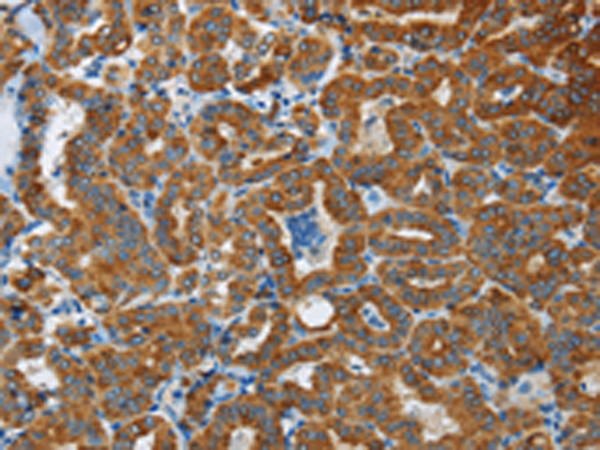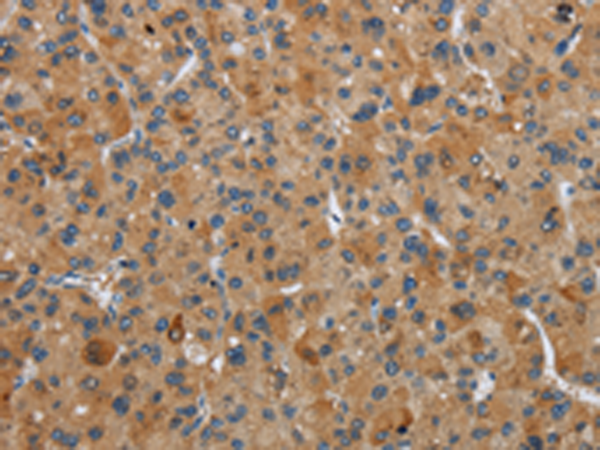

| WB | 咨询技术 | Human,Mouse,Rat |
| IF | 咨询技术 | Human,Mouse,Rat |
| IHC | 1/100-1/300 | Human,Mouse,Rat |
| ICC | 技术咨询 | Human,Mouse,Rat |
| FCM | 咨询技术 | Human,Mouse,Rat |
| Elisa | 1/2000-1/10000 | Human,Mouse,Rat |
| Aliases | BHD; FLCL |
| Host/Isotype | Rabbit IgG |
| Antibody Type | Primary antibody |
| Storage | Store at 4°C short term. Aliquot and store at -20°C long term. Avoid freeze/thaw cycles. |
| Species Reactivity | Human, Mouse, Rat |
| Immunogen | Fusion protein of human FLCN |
| Formulation | Purified antibody in PBS with 0.05% sodium azide and 50% glycerol. |
+ +
1. **"Interaction of folliculin (FLCN) with the molecular chaperones Hsp90 and Hsp70"**
- **作者**: Baba M, et al.
- **摘要**: 该研究通过免疫共沉淀和Western blot技术,利用FLCN特异性抗体验证了FLCN蛋白与热休克蛋白Hsp90和Hsp70的相互作用,揭示了其在蛋白质稳定性调控中的作用,为Birt-Hogg-Dubé综合征的分子机制提供依据。
2. **"Folliculin regulates cell-cell adhesion in kidney epithelial cells through AMPK-mediated phosphorylation"**
- **作者**: Medvetz DA, et al.
- **摘要**: 研究采用FLCN抗体进行免疫荧光和免疫组化分析,发现FLCN缺失导致肾上皮细胞间黏附异常,并激活AMPK信号通路,提示FLCN在细胞极性维持及肿瘤抑制中的关键功能。
3. **"Subcellular localization of folliculin (FLCN) determines its role in mTORC1 signaling and cellular energy sensing"**
- **作者**: Preston RS, et al.
- **摘要**: 通过FLCN抗体标记及细胞分馏实验,发现FLCN蛋白在溶酶体膜和细胞质间的动态定位调控mTORC1通路活性,进而影响细胞能量代谢与增殖,为靶向治疗提供新视角。
4. **"FLCN-deficient renal cancer cells exhibit hyperactivation of Wnt/β-catenin pathway"**
- **作者**: Hasumi H, et al.
- **摘要**: 研究使用FLCN抗体检测基因敲除模型中蛋白表达缺失,发现FLCN缺失通过激活Wnt/β-catenin通路促进肾癌进展,揭示了FLCN作为肿瘤抑制因子的新机制。
The FLCN antibody targets the folliculin (FLCN) protein, encoded by the *FLCN* gene, which is linked to Birt-Hogg-Dubé (BHD) syndrome—a rare autosomal dominant disorder associated with renal tumors, lung cysts, and skin lesions. FLCN functions as a tumor suppressor, interacting with binding partners like FNIP1/2 to regulate metabolic pathways, including mTOR and AMPK signaling, which influence cell growth, autophagy, and energy homeostasis. Mutations in *FLCN* disrupt these processes, contributing to tumorigenesis and cyst formation.
FLCN antibodies are essential tools in research to study protein expression, localization, and molecular mechanisms in disease models. They are used in techniques like Western blotting, immunohistochemistry (IHC), and immunofluorescence (IF) to assess FLCN levels in tissues or cell lines, particularly in studies exploring cancer biology or metabolic disorders. Commercial FLCN antibodies are typically validated for specificity using knockout controls and species reactivity (e.g., human, mouse).
Recent studies also investigate FLCN's role in lysosomal regulation and ciliary function, expanding its relevance beyond BHD syndrome. Researchers rely on high-quality FLCN antibodies to unravel its complex interactions in cellular pathways, aiding therapeutic development for related cancers and genetic diseases.
×